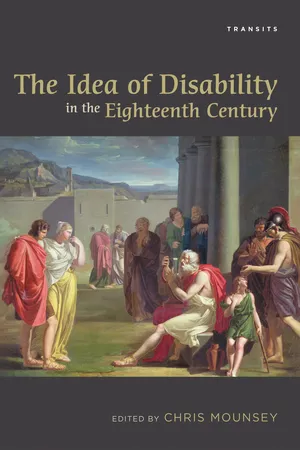
- English
- ePUB (mobile friendly)
- Available on iOS & Android
eBook - ePub
The Idea of Disability in the Eighteenth Century
About this book
The Idea of Disability in the Eighteenth Century explores disabled people who lived in the eighteenth century. The first four essays consider philosophical writing dating between 1663 and 1788, when the understanding of disability altered dramatically. We begin with Margaret Cavendish, whose natural philosophy rejected ideas of superiority or inferiority between individuals based upon physical or mental difference. We then move to John Locke, the founder of empiricism in 1680, who believed that the basis of knowledge was observability, but who, faced with the lack of anything to observe, broke his own epistemological rules in his explanation of mental illness. Understanding the problems that empiricism set up, Anthony Ashley Cooper, Lord Shaftesbury, turned in 1711 to moral philosophy, but also founded his philosophy on a flaw. He believed in the harmony of "the aesthetic trinity of beauty, truth, and virtue" but he could not believe that a disabled friend, whom he knew to have been moral before his physical alteration, could change inside. Lastly, we explore Thomas Reid who in 1788 returned to the body as the ground of philosophical enquiry and saw the body as a whole—complete in itself and wanting nothing, be it missing a sense (Reid was deaf) or a physical or mental capacity.
At the heart of the study of any historical artifact is the question of where to look for evidence, and when looking for evidence of disability, we have largely to rely upon texts. However, texts come in many forms, and the next two essays explore three types—the novel, the periodical and the pamphlet—which pour out their ideas of disability in different ways.
Evidence of disabled people in the eighteenth century is sparse, and the lives the more evanescent. The last four essays bring to light little known disabled people, or people who are little known for their disability, giving various forms of biographical accounts of Susanna Harrison, Sarah Scott, Priscilla Poynton and Thomas Gills, who are all but forgotten in the academic world as well as to public consciousness.
At the heart of the study of any historical artifact is the question of where to look for evidence, and when looking for evidence of disability, we have largely to rely upon texts. However, texts come in many forms, and the next two essays explore three types—the novel, the periodical and the pamphlet—which pour out their ideas of disability in different ways.
Evidence of disabled people in the eighteenth century is sparse, and the lives the more evanescent. The last four essays bring to light little known disabled people, or people who are little known for their disability, giving various forms of biographical accounts of Susanna Harrison, Sarah Scott, Priscilla Poynton and Thomas Gills, who are all but forgotten in the academic world as well as to public consciousness.
Frequently asked questions
Yes, you can cancel anytime from the Subscription tab in your account settings on the Perlego website. Your subscription will stay active until the end of your current billing period. Learn how to cancel your subscription.
At the moment all of our mobile-responsive ePub books are available to download via the app. Most of our PDFs are also available to download and we're working on making the final remaining ones downloadable now. Learn more here.
Perlego offers two plans: Essential and Complete
- Essential is ideal for learners and professionals who enjoy exploring a wide range of subjects. Access the Essential Library with 800,000+ trusted titles and best-sellers across business, personal growth, and the humanities. Includes unlimited reading time and Standard Read Aloud voice.
- Complete: Perfect for advanced learners and researchers needing full, unrestricted access. Unlock 1.4M+ books across hundreds of subjects, including academic and specialized titles. The Complete Plan also includes advanced features like Premium Read Aloud and Research Assistant.
We are an online textbook subscription service, where you can get access to an entire online library for less than the price of a single book per month. With over 1 million books across 1000+ topics, we’ve got you covered! Learn more here.
Look out for the read-aloud symbol on your next book to see if you can listen to it. The read-aloud tool reads text aloud for you, highlighting the text as it is being read. You can pause it, speed it up and slow it down. Learn more here.
Yes! You can use the Perlego app on both iOS or Android devices to read anytime, anywhere — even offline. Perfect for commutes or when you’re on the go.
Please note we cannot support devices running on iOS 13 and Android 7 or earlier. Learn more about using the app.
Please note we cannot support devices running on iOS 13 and Android 7 or earlier. Learn more about using the app.
Yes, you can access The Idea of Disability in the Eighteenth Century by Chris Mounsey in PDF and/or ePUB format, as well as other popular books in Literature & English Literary Criticism. We have over one million books available in our catalogue for you to explore.
Information
Table of contents
- Contents
- Acknowledgments
- Introduction
- Part I: Methodological
- Chapter 1: “Perfect according to their Kind”
- Chapter 2: What’s the Matter with Madness?
- Chapter 3: Defections from Nature
- Chapter 4: Thomas Reid
- Part II: Conceptual
- Chapter 5: “An HOBBY-HORSE Well Worth Giving a Description of”
- Chapter 6: “One cannot be too secure”
- Part III: Experiential
- Chapter 7: “On that rock I lay”
- Chapter 8: Attractive Deformity
- Chapter 9: Reading “The Blind Poetess of Lichfield”
- Chapter 10: God grant us Grace, that we may take due Pains, To practice what this Exercise contains; To which, if we apply our best Endeavour, We shall be happy here, and bless’d for ever.
- Bibliography
- About the Contributors